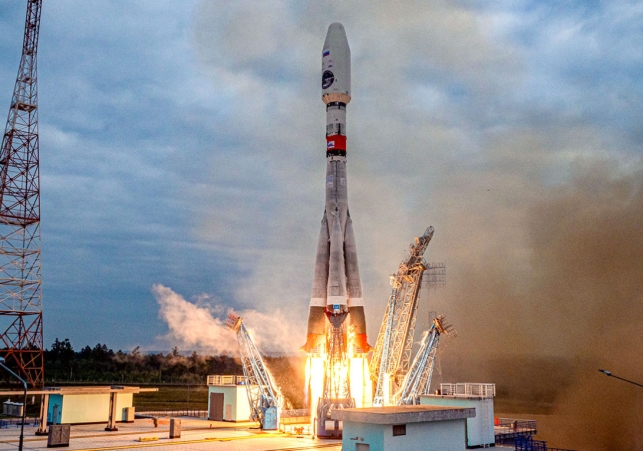
Russia Launches Moon Mission After 50 Years
Russia Resumes Lunar Exploration: Launching Moon Mission After 50 Years
After a hiatus of nearly five decades, Russia has embarked on a significant lunar mission by launching a lunar landing craft, named Luna-25, from the Vostochny spaceport in the Far East. This mission aims to achieve a lunar landing before an Indian spacecraft, marking a renewed focus on lunar exploration. The last time Russia undertook such a mission was in 1976, during the Soviet era.
Russia's Ambitious Lunar Mission:
The Luna-25 craft, carried by a rocket, is on a mission to reach the moon by August 23. This timeline coincides with the expected arrival of an Indian spacecraft that was launched on July 14. The journey to the moon's vicinity will take approximately 5.5 days for the Russian spacecraft. Subsequently, it will spend three to seven days orbiting at a distance of about 100 kilometers (62 miles) from the lunar surface before initiating its descent.
ALSO READ: Australian Journalist's Heartfelt Letter from Detention in China
Chasing Lunar Landing Success:
Historically, only three nations have accomplished successful moon landings: the United States, the Soviet Union, and China. Both Russia and India aspire to become the first to achieve a moon landing at the moon's south pole. The objective for Russia, as stated by its space agency Roscosmos, extends beyond lunar study – it aims to demonstrate its capability to transport payloads to the moon and secure reliable access to the lunar surface.
Geopolitical Factors at Play:
According to prominent Russian space analyst Vitaly Egorov, the mission's underlying purpose revolves around the geopolitical rivalry between two superpowers, China and the USA. This rivalry has sparked interest among several other nations vying for recognition as space superpowers. In this context, the lunar mission serves as a manifestation of political competition rather than a pure scientific pursuit.
ALSO READ: Escalating Drone Threat: Russian Air Defences Intercept Ukrainian Drone Targeting Moscow
Challenges and Adaptations:
Russia's access to Western technology has been hindered by sanctions imposed due to its involvement in the Ukraine conflict. Consequently, its space program has been impacted, necessitating adaptations in its approach. Initially, the Luna-25 was designed to carry a small moon rover. However, this plan was abandoned to enhance the craft's reliability by reducing its weight. According to Egorov, foreign electronics are lighter, which is a crucial factor in space missions. The focus for Roscosmos is not solely on scientific objectives, but also on reclaiming expertise from the Soviet era and adapting it for modern challenges.
Successful Launch and Significance:
The launch of Luna-25 from the Vostochny Cosmodrome marked a successful start to Russia's renewed lunar exploration efforts. This spaceport holds particular importance in Russian President Vladimir Putin's vision of strengthening Russia's status as a space superpower. The shift from relying on the Baikonur Cosmodrome in Kazakhstan to launching from Vostochny reflects Putin's strategic efforts.





